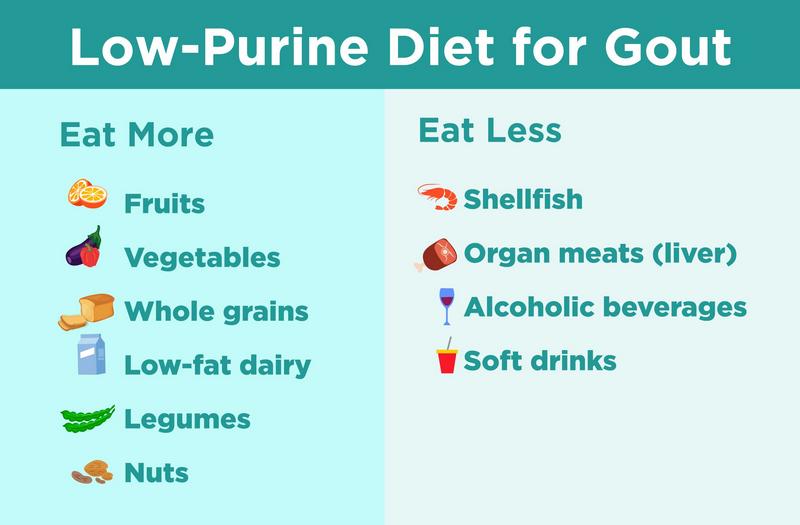Top 5 Dietary Tips to Prevent Gout
By Dr Michael MacDonald

A form of arthritis, gout is caused by a buildup of uric acid, which occurs when the body contains too much purine. Purine is produced in the body naturally, but it is also present in many foods. The extra uric acid forms crystals around joints, especially in the big toes (although other joints are also often affected).
It causes pain, which is sometimes intense, swelling, redness, stiffness, or any combination of these symptoms. It is wholly unpleasant, even in small flare-ups, but you can follow some dietary rules to lessen the number of flares and their severity.
1. Avoid Alcohol, Beer Especially
When you consume alcohol, your kidneys and liver are more concerned with processing alcohol than uric acid. This results in more uric acid circulating in the bloodstream. Beer is especially bad, as it contains higher levels of purine than other types of alcohol. While some research has shown that an occasional glass of wine for those prone to gout is acceptable, it is best to avoid alcohol altogether to be on the safe side.
2. Watch Your Protein Sources
To keep a gout-friendly diet, make sure to choose protein sources that are low in purines. Meats high in saturated fats are a particular culprit, such as red meat, most pork products like bacon and ham, and organ meats such as liver, brain, kidneys, and sweetbreads. Even fatty parts of poultry, which is generally considered healthier meat, should be avoided, such as chicken and turkey’s skin and wings. Sticking to skinless poultry breasts cooked without high-fat oils is safest as far as animal protein is concerned. An even better alternative is meatless options of protein. Foods based on tofu and soy are very low in purines and are packed with flavor when appropriately prepared.
3. Avoid Sugars
Sodas are an obvious culprit for sugars, but less apparent options are also at fault. Fruit juices are often high in both natural and added sugars. Breakfast cereals are also a hidden danger. Be sure to check the nutrition label and ingredient list of anything you eat to ensure the sugar levels are low. Even if the nutrition label says zero sugar, be aware of different terms for artificial sweeteners in the ingredients list, such as honey, high fructose corn syrup, dextrose, fructose, and sucrose, all names that mean added sugar. Excess sugar is detrimental to uric acid levels in gout sufferers, so sticking to low sugar and sweetener options is essential.
4. Avoid Refined Carbs
Love a good peanut butter sandwich? Try using whole grain bread or a multigrain bagel instead of that white bread! Processing refined carbs can cause a spike in blood sugar, and as we’ve just discussed, higher levels of sugar in the blood is detrimental for those prone to gout. Additionally, whole grains are better for your body and digestive system. It can even help you to lose weight! Overweight and obese people suffer more from gout symptoms, so doctors often suggest losing weight to those suffering from gout that are above a healthy weight. While the scale often used to determine a “healthy” weight (the BMI scale) is coming under scrutiny, the simple fact is that having an excess of fat results in more severe gout symptoms.
5. Stay Hydrated
Because an excess of uric acid causes gout, and uric acid is passed from the body through the urinary tract, having a healthy urinary tract is essential to preventing severe gout attacks. Staying well hydrated through a high intake of pure water can help improve the painful symptoms of gout. Because uric acid is removed through the urinary system, maintaining a high water intake will help keep the removal method in working order to reduce the amount of uric acid in your system.
Honorable Mentions
Cherries, Coffee, Vitamin C, citrus fruits … all these are foods that have been shown in some studies to lessen the symptoms of gout and reduce the intensity of flares. While these studies are inconclusive about their effectiveness or why they may provide benefits, there is one clear thing: They certainly don’t hurt! Most of these foods people consider quite pleasant. Coffee especially can be a welcome beverage for gout sufferers, as the caffeine content can ease the discomfort caused by the absence of sugary sodas, which also contain caffeine, and is a go-to pick me up in the morning or to reduce the need for an afternoon nap.
While gout is an awful affliction that can cause intense pain, there are some ways to minimize discomfort. Keeping a diet that is low in high-purine foods will certainly help. Keeping hydrated, being mindful of protein choices, avoiding alcohol, limiting added sugar and sugar substitutes, and eating complex carbohydrates will reduce the frequency and intensity of gout symptoms. While it is an unfortunate diagnosis, there are ways to manage gout, and being proactive about your diet is an excellent way to do so.

